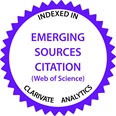ORCID
Klaudia Blachnicka: 0000-0002-9788-9082
Keywords
mentor, female managers, mentee, mentoring dimensions, development
Abstract
Purpose: The objective of the article is to identify the dimensions of mentoring experienced by female managers. The recognition of the mentoring dimensions serves a significant role in enhancing the understanding of the support received by the mentee and facilitating an accurate evaluation of mentoring within the managerial context, especially in the Polish socio-economic conditions.
Design/methodology/approach:The paper presents the results of an exploratory factor analysis based on data, acquired through an online questionnaire, from 370 female managers at basic, middle and senior levels of management. 18 items Global Measure of Mentoring Practices were used to examine the extent of mentoring actions experienced by female managers.
Findings: The study discovered that mentoring female managers can be analyzed in three dimensions. Psychosocial, cognitive and patronage mentoring were distinguished. All mentor activities indicated in the questionnaire were included and allocated to the relevant dimensions of mentoring.
Practical implication: The study offers several recommendations based on the results of the research that address the diagnosis of mentoring, which is important in the process of evaluating the mentoring relationship and assessing its effectiveness.
Originality/value: The current research provides novel insights about the mentoring relationship among managerial staff. The mentoring support received by managers can be analyzed in three dimensions, related to the various activities undertaken by the mentor.
Streszczenie
Cel: celem artykułu jest identyfikacja wymiarów mentoringu doświadczanego przez menedżerki. Rozpoznanie wymiarów mentoringu odgrywa istotną rolę w lepszym zrozumieniu wsparcia otrzymywanego przez podopiecznych i ułatwia trafną ocenę mentoringu w kontekście menedżerskim, szczególnie w polskich warunkach społeczno-ekonomicznych.
Projekt/metodologia/podejście: w artykule przedstawiono wyniki eksploracyjnej analizy czynnikowej opartej na danych uzyskanych za pomocą kwestionariusza ankiety. Dane pozyskano od 370 menedżerek podstawowego, średniego i wysokiego szczebla zarządzania. Do zbadania zakresu działań mentoringowych doświadczanych przez nie wykorzystano kwestionariusz Global Measure of Mentorship Practices (GMMP) składający się z 18 pozycji.
Wnioski: badanie wykazało, że mentoring doświadczany przez menedżerki może być analizowany w trzech wymiarach: psychospołecznym, poznawczym i patronackim. Wszystkie działania mentora wskazane w kwestionariuszu zostały uwzględnione i przypisane do odpowiednich wymiarów mentoringu. Praktyczne implikacje: badanie oferuje kilka rekomendacji, które odnoszą się do diagnozy mentoringu, co stanowi istotną rolę w procesie ewaluacji relacji mentorskiej i oceny jej skuteczności.
Oryginalność/wartość: badania dostarczają nowych spostrzeżeń na temat relacji mentorskiej wśród kadry kierowniczej. Badania wykazały, iż wsparcie mentorskie otrzymywane przez menedżerów można analizować w trzech wymiarach, związanych z różnymi działaniami podejmowanymi przez mentora.
Acknowledgments
Funding
The article presents the results of the Project 64/ZZO/2023/PRO financed from the subsidy granted to the Krakow University of Economics.
Declaration of Conflicting Interests
The author declared no potential conflicts of interest with respect to the research, authorship, and publication of this article.
Declaration about the scope of AI utilization
The authors used the AI tool ChatGPT to help check grammar (only) in the preparation of this article.
Recommended Citation
Blachnicka, K. (2024). Dimensions of Mentoring Among Female Managers – an Explanatory Factor Analysis Based on the Global Measure of Mentoring Practices. European Management Studies, 22(1), 4-24. https://doi.org/10.7172/2956-7602.103.1
First Page
4
Last Page
24
Page Count
21
Received Date
10.10.2023
Accepted Date
05.04.2024
Online Available Date
19.04.2024
DOI
10.7172/2956-7602.103.1
JEL Code
J53, M12
Publisher
University of Warsaw







